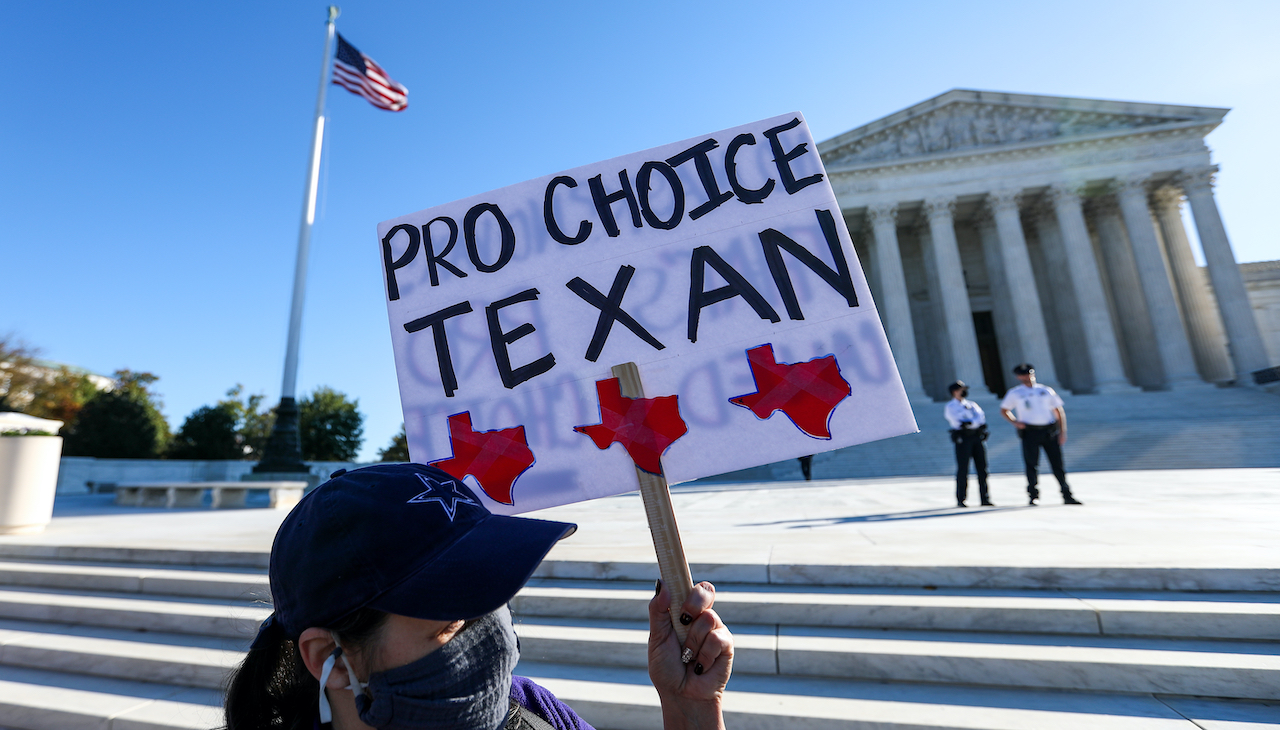
Most Texas voters believe some form of abortion should be available, per new poll
The poll from UT Austin was conducted through its Texas Politics Project and surveyed 1,200 registered voters in the state in April 2022.
At a time when Texas is on the brink of outlawing the vast majority of abortions if the Supreme Court overturns constitutional protections for the procedure, a recent poll from the Texas Politics Project at UT Austin found that most voters in the state believe abortion access should be permitted in some form.
If the high court does move to overturn Roe v. Wade, a future that seems likely given the nonbinding draft opinion that was leaked on Monday, performing abortions in Texas could quickly become a felony. Constitutional protections for abortion could disappear as soon as this summer.
Only 15% of respondents to a recent University of Texas at Austin poll said access to the procedure should be completely outlawed. https://t.co/5NrIdkDsTz
— KENS 5 (@KENS5) May 4, 2022
In a passionate rant to reporters on Tuesday, May 3, Sen. Elizabeth Warren said that Republicans have been working towards stripping citizens of their reproductive freedom “for decades.”
“They have been out there plotting, carefully cultivating these Supreme Court justices so they could have a majority on the bench who would accomplish something that the majority of Americans do not want,” Warren said.
Warren was referring to a 2020 poll by the Kaiser Family Foundation which found that 69% of adults did not want to see Roe v. Wade overturned.
This is especially true for Texas residents, as the UT Austin poll showed. The survey, which was conducted in April and surveyed 1,200 registered voters, found that 78% of residents believed that abortion should be allowed in some form, while only 15% said it should be banned.
New UT/Texas Politics Project Poll data: 35% of Texans support, 54% oppose banning abortion in Texas if #SCOTUS overturns Roe.
— Jim Henson (@jamesrhenson) May 4, 2022
GOP: 57% support, 34% oppose
Dems: 12% support, 80% oppose
Indpts: 26% support, 57% opposehttps://t.co/W5Ys5Jomjv #txlege #Tx2022 pic.twitter.com/B7sNvpRv4I
If Roe is overturned, Texas would only allow doctors to perform abortions if a person’s life is at risk or if the person is at risk for “substantial impairment of a major bodily function.” There would be no exceptions for cases of sexual assault or incest.
Around 39% of survey participants said that Texas residents should always be able to obtain the procedure as a matter of personal choice, and 11% said it should be available for other reasons, in addition to pregnancies that result from sexual assault.
Twenty-eight percent of respondents felt that abortion should only be available in cases of rape or incest or when a person’s life is in danger, and 7% were unsure of where they stood on the issue.
Texas has already experienced a preview of a post-Roe America for the last eight months. Since September 2021, residents have been living under the country’s most restrictive abortion law, which bans the procedure after about six weeks of pregnancy.
The legislation also allows for ordinary citizens to enforce it, through offering a cash incentive to those who file lawsuits against someone they think is breaking the law.
The law rewards at least $10,000 for every lawsuit that successfully blocks a pregnant person from getting an abortion in the state.
“For months, Texans have had to navigate a six-week abortion ban and bounty law that has upended access to essential care. [The Supreme Court’s] draft majority opinion confirms what we’ve anticipated all along: the end of our guaranteed right to abortion is imminent,” said Ana Ramón, interim executive director of the political action committee Annie’s List.
RELATED CONTENT
At first, data indicated that the number of abortions in the state decreased by more than half after the new law went into effect last September. But over time, it became clear that Texas residents were finding ways to access the procedure, even if it meant traveling long distances or breaking the law.
For example, The New York Times evaluated two studies from the University of Texas at Austin which found that out-of-state abortions and online requests for abortion pills filled in much of the gap for pregnant people who normally would have sought an abortion in the state.
Additionally, the Texas Policy Evaluation Project discovered that 1,400 Texans each month obtained abortions at clinics in seven nearby states after the law went into effect.
“The law has not done anything to change people’s need for abortion care; it has shifted where people are getting their abortion" - Kari White, Texas Policy Evaluation Projecthttps://t.co/Rd3RUTk3KH
— NNAF Abortion Funds (@AbortionFunds) March 7, 2022
“There has been no significant downward trend in the number of abortions between September and December 2021. Many pregnant Texans have been traveling to neighboring states to obtain abortion care, and some have traveled as far as Illinois, Maryland, and Washington,” the report said.
Another study, conducted by Abigail Aiken, a professor at the University of Texas’ LBJ School of Public Affairs, found that requests for abortion pills from an international reproductive rights nonprofit soared after the law went into effect.
Even though Texas passed another law in 2021 that made it illegal to prescribe abortion-inducing medications, it didn’t stop more than 130 Texans per day from requesting them.
These findings don’t take into consideration the amount of pregnant people who may have sought abortion-inducing medication from other sources, cross the border to Mexico for the procedure, or terminated a pregnancy in some other way.
“It’s clear from this research and many studies that just because you make abortion harder to get, it doesn’t mean the need for abortion goes away. And many people, they will look for other ways of doing that,” Aiken told The Texas Tribune.
“When you ask Texans directly, do you want abortion to be illegal? Do you want Roe v. Wade to be overturned? More than half routinely say they do not. And again, that includes a significant share of Republicans,” Jim Henson, director of the Texas Politics Project, said Tuesday.
"When you ask Texans directly, do you want abortion to be illegal? Do you want Roe v Wade to be overturned? More than half routinely say they do not. And again, that includes a significant share of Republicans," Henson says, pointing to TX Politics Project's Feb. polling. (2/)
— Maggie Glynn (@maggie_glynn1) May 3, 2022
If Roe is overturned, Henson expects that it will create a “mobilization opportunity for Democrats” to get more people to vote in the 2022 election, including independents.











LEAVE A COMMENT:
Join the discussion! Leave a comment.